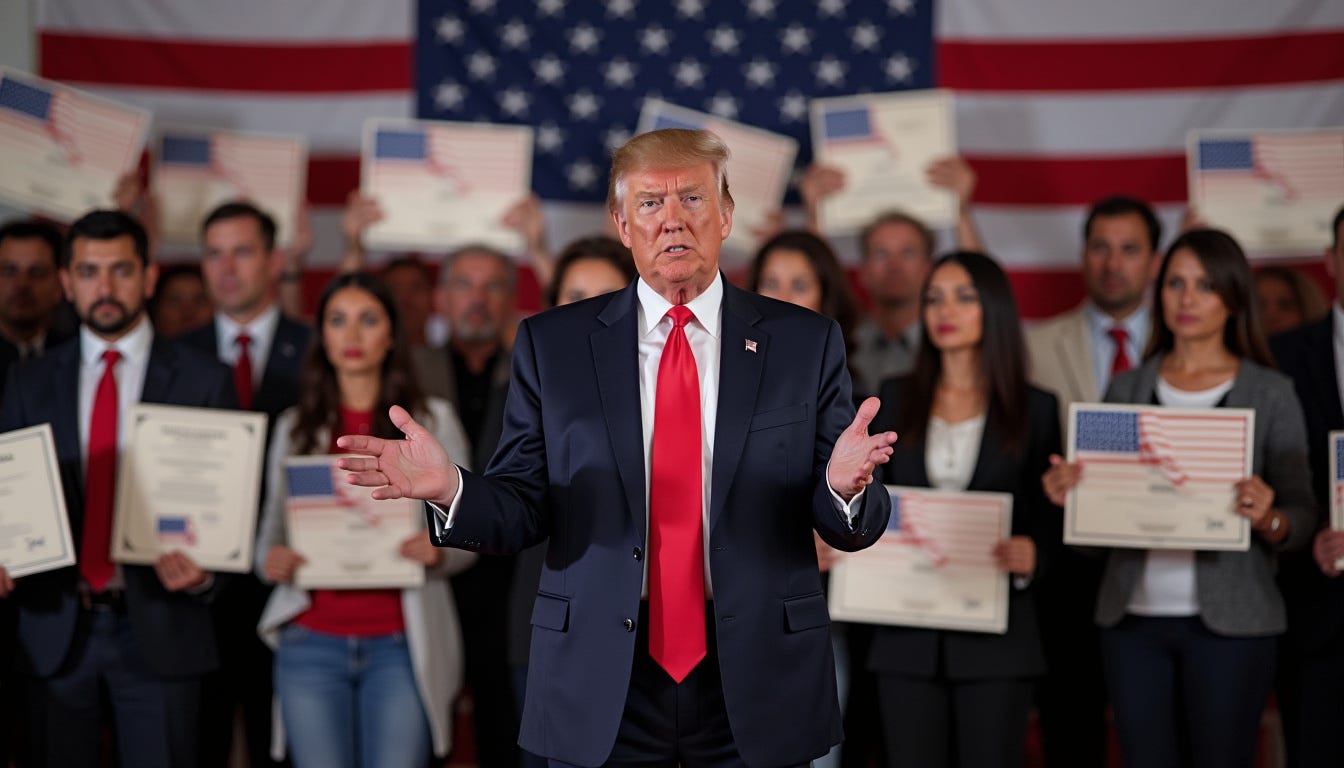Poll Reveals Majority of Republicans Oppose Expanding Trump's Presidential Powers
A recent CBS News/YouGov poll reveals that most Republican voters do not favor expanding President Donald Trump's executive powers, preferring to maintain congressional oversight of his administration. The survey, conducted on March 27-28, 2025, found that while Republicans overwhelmingly support Trump's policy initiatives, they remain cautious about granting him unchecked authority. Only 32% of Republicans believe Trump should have more power, 55% think his current level of influence is sufficient, and 13% suggest his authority should be curtailed. This sentiment extends to congressional oversight, with 63% of Republicans stating that GOP lawmakers should challenge Trump's policies when they disagree rather than automatically aligning with his agenda.
Republicans Support Checks and Balances
The poll highlights a nuanced position among Republican voters who firmly back Trump's policies but still value traditional governmental checks and balances. A significant 63% of Republicans believe GOP lawmakers in Congress should challenge Trump's policies when they disagree, rather than automatically aligning with his agenda.
"Despite strong backing for Trump's policies, there are limits to how much power he should wield," notes the Economic Times, citing the CBS News/YouGov poll results.
This perspective extends beyond congressional oversight to judicial review as well. The survey found that 56% of Republicans support the judiciary's role in reviewing Trump's policies, while 44% believe courts should not interfere. This division underscores an ongoing debate within the party about the proper balance of power within the federal government.
The broader public sentiment is even stronger regarding congressional oversight, with 79% of all respondents stating that Congress should push back against Trump when needed.
Strong Policy Support Despite Power Concerns
While Republicans may be cautious about granting Trump more power, they remain overwhelmingly supportive of his policy initiatives. According to the poll, 88% approve of his economic policies, 92% back his stance on immigration, 89% support his handling of the Ukraine-Russia conflict, and 64% favor his controversial proposal to acquire Greenland.
Trump's overall approval rating among Republicans is 91%, significantly higher than his 50% approval among all voters. This contrasts sharply with Democrats, who oppose him vigorously, with 88% expressing disapproval.
According to Forbes3, independent voters remain more divided on Trump's performance, with 43% approving and 57% disapproving.
The Department of Government Efficiency Question
The poll also examined attitudes toward billionaire Elon Musk's Department of Government Efficiency (DOGE), a relatively new agency focused on streamlining federal operations. Most respondents (61%) believe DOGE's current authority over personnel decisions is appropriate, 23% think it has excessive power, and only 16% believe it lacks adequate influence.
This balanced view of DOGE's role reflects broader Republican sentiment about governmental power: Republicans are supportive of reform initiatives but cautious about concentrating too much authority in any single entity.
Historical Context and Earlier Polling
The CBS News/YouGov poll results align with findings from earlier surveys conducted since Trump began his second term. A Pew Research Center poll from January 27 to February 2 found that 55% of Republicans believed GOP congressional leaders are not obligated to support Trump's policies and programs if they disagree.
That earlier survey also revealed a divided American public regarding Trump's impact on government, with 41% saying his administration would improve the federal government and 42% saying it would worsen things.
The Pew Research poll found that 67% of Republicans supported all or most of Trump's plans and policies, while 84% of Democrats supported few or none. These partisan divisions have remained consistent throughout Trump's presidency.
Immigration Remains Trump's Strongest Issue
While the CBS News/YouGov poll focused on power and oversight questions, other recent polls suggest that immigration remains Trump's most substantial policy area regarding public approval. A Reuters/Ipsos survey found that approximately half of U.S. respondents expressed approval of Trump's immigration policies, contrasting with just over a third who felt positively about his efforts to manage rising costs.
About 86% of Republicans endorsed Trump's immigration measures, while approximately 69% supported his approach to handling the cost of living, according to the Reuters/Ipsos poll conducted from March 21-23.
A separate Pew Research study found that 59% of Americans approve of Trump's increasing efforts to deport people living in the U.S. illegally, including 35% who strongly agree. Similarly, 58% approve sending additional military forces to the U.S.-Mexico border.
The Signal Controversy
The CBS News poll also addressed a recent controversy involving Trump administration officials using the encrypted messaging app Signal to communicate about military strategies. A majority of Republicans (60%) consider these discussions inappropriately serious, and 56% think using Signal for military discussions is not suitable.
This view aligns with the broader public sentiment, as 76% of all respondents find using Signal for such purposes inappropriate. The controversy emerged after Jeffrey Goldberg, CEO of The Atlantic, reported being inadvertently added to a group chat where Cabinet members discussed sensitive military operations via the encrypted app.
Implications for Governance
As Trump's second term progresses, the poll results suggest he may face challenges within his party if he pushes for expanded executive authority. While Republicans strongly support his policy agenda, they appear unwilling to abandon traditional checks and balances that limit presidential power.
The ongoing tension between strong policy support and concerns about unchecked authority will likely shape how the administration approaches governance in the coming years. While Trump enjoys nearly universal approval among Republicans for his policy initiatives, the party's commitment to constitutional constraints indicates that even popular presidents face limits on their authority in the American system of government.



